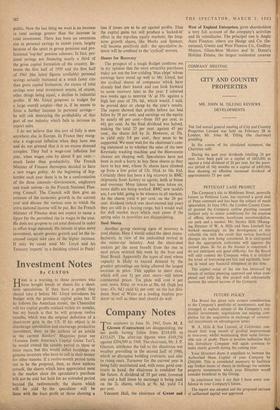Investment Notes
By CUSTOS HERE is a warning to those investors who have bought bonds or shares for a short- term speculation. If they have a profit they should take it before Mr. Lloyd introduces his Budget with the promised capital gains tax. If he follows the American model, the Chancellor will tax capital profits realised within six months, but my hunch is that he will propose twelve months, which was the original definition of a short-term gain in the US. If his object is to discourage speculation and encourage productive investment, then, as the authors of an article in the current Bankers' Magazine point out (`Lessons from America's Capital Gains Tax'), he would extend the taxable period to three or more years, but this would inflict hardships on , genuine investors who have to call in their money for other reasons. If a twelve-month period turns out to be the proposal, then, as these authors remark, the shares which have appreciated most in the market since the speculator's purchase will not be sold but held for an extended period beyond the twelvemonth; the shares which will be sold by the speculator will be those with the least profit or those showing a
loss if losses are to be set against profits. Thus the capital gains tax will produce a locked-in' effect in the top-class equity markets; the long- term growth shares, like Marks and Spencer, will become positively dull: the speculative in- terest will be confined to the 'cyclical' movers.
Shares for Recovery The prospect of a tough Budget confirms me in my opinion that the most attractive purchases today are not the low-yielding 'blue chips' whose earnings have stood up well to Mr. Lloyd, but the cyclical shares of companies which have already had their knock and can look forward to some recovery later in the year. I referred two weeks ago to HOOVER 'A' at 35s. against a high last year of 55s. 6d., which would, I said, be proved dear or cheap by, the year's results. The report showed that profits before tax had fallen by 38 per cent. and earnings on the equity by nearly 60 per cent.—from 105 per cent. to 441 per cent. As the final dividend was halved, making the total 25 per cent. against 45 per cent., the shares fell by 2s. However, at 33s. to yield only 3.8 per cent., they seem to be supported. We must wait for the chairman's com- ing statement as to whether the sales of the new Keymatic washing machine and the Hooverette cleaner are shaping well. Speculators have not been in such a hurry to buy these shares as they have to buy smc, whose 5s. shares have climbed up from a low point of 12s. 10/d. to 16s. 81d. Certainly there has been a big recovery in BMC shipments from factory to agents, both at home and overseas. More labour has been taken on, more shifts are being worked. BMC new models are, I am told, going to be winners in all markets. As the shares yield 6 per cent. on the 20 per cent. dividend (which was short-earned last year) they are still in a buying range, but I would wait for dull market days which may come if the spring sales to motorists are disappointing.
Steel Shares Another group showing signs of recovery is steel shares. Here I would select the sheet manu- facturers, in view of the undoubted revival in the motor-car industry. And the sheet-steel makers get the most benefit from the rise in steel prices ordered this week by the Iron and Steel Board. Apparently the types of steel where capacity is likely to exceed demand by the greatest percentage are being allowed the largest increase in price. This applies' to sheet steel, which will cost 51 per cent. more—still below continental prices. Tin plate will cost 4 per Cent. more. STEEL OF WALES at 30s. 6d. (high last year, 47s. 9d.) yield 6f per cent. on the last divi- dend. Steel of Wales as a leading tinplate pro- ducer as well as sheet steel should do well.


































 Previous page
Previous page